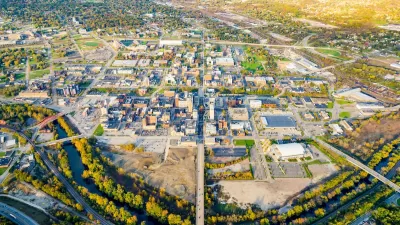Faced with a national housing crisis, it's time for cities to stop letting social mores dictate who can live where.
In Slate, Henry Grabar chronicles the demise of a co-op in Boulder that symbolized a conflict between young adults trying to make ends meet and "the old guard—slow-growth homeowners who moved here decades ago."
In many cities across the United States, groups of friends and acquaintances who can't afford to rent or buy homes on their own are moving into houses together, Grabar writes:
High rents and the limits of the housing stock have forced tenants—a generation of young people and immigrants—into larger, underused homes ill-suited (or too expensive) for America’s shrinking families.
But this common living arrangement is illegal in many cities under occupancy laws limiting the number of unrelated adults who can live together.
By targeting the legal relationship of cohabitants instead of their living conditions, Grabar notes, such ordinances don't protect safety but rather police personal relationships through a particular definition of legal terms like "family" and "household."
"Distinct from overcrowding laws that regulate the amount of space per person, the occupancy law is a widespread modern policy of social preference, not of public health or safety," he writes.
While advocacy has convinced Boulder to begin reconsidering its approach to co-ops, Grabar urges that other adaptations to the housing market that are not university town trends not be thrown under the bus.
Legalizing co-ops won’t do much for the city’s other illegal tenants, especially if it’s part of a bargain that renews enforcement on other illegally occupied residences.
FULL STORY: Full House

Maui's Vacation Rental Debate Turns Ugly
Verbal attacks, misinformation campaigns and fistfights plague a high-stakes debate to convert thousands of vacation rentals into long-term housing.

Planetizen Federal Action Tracker
A weekly monitor of how Trump’s orders and actions are impacting planners and planning in America.

San Francisco Suspends Traffic Calming Amidst Record Deaths
Citing “a challenging fiscal landscape,” the city will cease the program on the heels of 42 traffic deaths, including 24 pedestrians.

Defunct Pittsburgh Power Plant to Become Residential Tower
A decommissioned steam heat plant will be redeveloped into almost 100 affordable housing units.

Trump Prompts Restructuring of Transportation Research Board in “Unprecedented Overreach”
The TRB has eliminated more than half of its committees including those focused on climate, equity, and cities.

Amtrak Rolls Out New Orleans to Alabama “Mardi Gras” Train
The new service will operate morning and evening departures between Mobile and New Orleans.
Urban Design for Planners 1: Software Tools
This six-course series explores essential urban design concepts using open source software and equips planners with the tools they need to participate fully in the urban design process.
Planning for Universal Design
Learn the tools for implementing Universal Design in planning regulations.
Heyer Gruel & Associates PA
JM Goldson LLC
Custer County Colorado
City of Camden Redevelopment Agency
City of Astoria
Transportation Research & Education Center (TREC) at Portland State University
Jefferson Parish Government
Camden Redevelopment Agency
City of Claremont





























